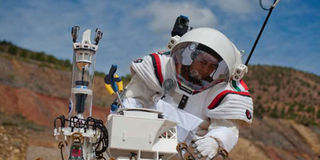Technological revolution defines our culture, the past and present

Colombian astronaut Diego Urbina tests the Gandolfi 2 spacesuit next to 'Yemo' robot during the Moonwalk project's first Mars mission simulation in the southwestern Spanish town of Minas de Riotinto, Huelva province, on April 22, 2016. The goal of project MOONWALK is to develop and test technologies and training procedures for future human missions to Moon and Mars. PHOTO | AFP
What you need to know:
- We are experiencing a shift today that is as revolutionary to society and culture as the Industrial Revolution was in the 1800s.
- This revolution has been occurring over the course of a few decades by the development of computers.
- In the coming years, smartphones will gradually be joined by smart appliances, smart buildings, smart cars, and smart robots.
- Our obsession with social media and interpersonal connections via email and WhatsApp can overwhelm our analog lives in the real world.
For generations, “culture” was a relatively static concept; culture was so static, in fact, that “culture” and “life” were essentially indistinguishable.
For generations, people lived as their parents and grandparents had lived. Major shifts in society, and corresponding shifts in culture, were separated by large amounts of time.
The development of the steam engine was perhaps the most important and revolutionary event in society and culture, causing a shift more comprehensive even than the agrarian revolution.
With the steam engine, humans were no longer limited by the power of their own muscles. The magnitude of the transformation brought by the Industrial Revolution had not been seen for centuries.
We are experiencing a shift today that is as revolutionary to society and culture as the Industrial Revolution was in the 1800s. This revolution is about enhancing our mental abilities. This revolution has been occurring over the course of a few decades by the development of computers. This revolution is known as the digital revolution and has or will change everything in our society and culture.
The changes in Kenya have been in some cases slower and in some cases faster than changes in other countries. Our adoption of mobile phones is well-documented and nothing short of incredible, but our adoption of the Internet is only just beginning.
In the coming years, smartphones will gradually be joined by smart appliances, smart buildings, smart cars, and smart robots. Such devices will play an integral (or even defining) role in our culture of tomorrow.
The digital revolution has begun to shape our modern culture in ways that are unprecedented and scary. Our children are hyper-connected to one another and to the world. Our work is no longer confined to the office — we are in touch with colleagues, clients, and bosses 24/7, and the work-life boundary has all but disappeared.
INTERPERSONAL CONNECTIONS
Socially, our culture exists now online as much (or more?) than offline. Our obsession with social media and interpersonal connections via email and WhatsApp can overwhelm our analog lives in the real world.
Cultural aspects from once far away lands are joining Kenyan life at an incredible pace. Sometimes this happens quite loudly — Netflix and the Kenya Film Classification Board made media headlines over what amounted to a battle for the control of Kenyan television content.
Sometimes the joining is barely noticed by anyone — a coffeehouse culture with the associated digital connectivity was completely unknown 10 years ago in Kenya but is growing in popularity every day.
If history is a guide, throughout this digital revolution, artists and artistic works will sometimes struggle to keep pace with the changes and will other times be at the forefront of determining society’s path.
Traditional artists may struggle with the online ecosystem — a place where traditional stone carvings are easily replicated by a digital file and a 3-D printer. Digital artists embrace and revel in the new ecosystem — a place where once-obscure graffiti and graffiti artists can now be seen instantly around the world, bringing about cultural and political revolutions as their works reach the general populace.
This year, the World Intellectual Property Day seeks to highlight the digital revolution and its influence on our culture. Should we celebrate the enhancements or should we mourn lost culture? We have the ability to instantly transmit our culture in glorious high definition video to the farthest reaches of the planet. Should this ability be overshadowed by the occasional (or even frequent) misuse of our culture by ourselves and others?
We tend to think of “culture” as historical — the traditions, art, stories, and songs of our ancestors that have survived the ages. As we celebrate World Intellectual Property Day today, let us not forget that culture and life have always been linked. Our modern culture defines who we are just as much, or more, than our historical culture.
Dr Rutenberg is the director of the Centre for Intellectual Property and Information Technology Law at Strathmore Law School. [email protected]




